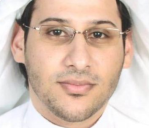On 6 July 2014, the Saudi Specialized Criminal Court sentenced Waleed Abu al-Khair to 15 years in prison, a 15-year travel ban, and a fine of 200,000 Saudi riyals. To mark the passing of one year since his unjust sentencing, the international human rights community has put forward a series of testimonials that highlight Waleed’s work as an attorney and human rights activist, detail the Saudi government’s efforts to silence him, and prove, as he has written, that “even from prison, you can still light a candle.”
Waleed’s Activism
“Needed political and social reforms do not occur spontaneously, nor are they the products of wishful thinking. The establishment of an impartial system of justice in Saudi Arabia requires, as it has elsewhere, the personal endeavors of men and women like Waleed. In recognition of the importance of this struggle, the international community should continue using all avenues available to press for his immediate release and for the Saudi government’s adoption of real and lasting legal and political reform.”
-Husain Abdulla, Executive Director of Americans for Democracy & Human Rights in Bahrain (ADHRB)
As a proponent of political and social reform in Saudi Arabia, Waleed fully engaged in the struggle for human rights. In 2007, he and a group of activists released a petition entitled, “Parameters of a Constitutional Monarchy,” a bold challenge to the Saudi king’s unchecked powers. In 2008, Waleed organized a 48-hour hunger strike in solidarity with Saudi prisoners of conscience. That same year, he founded “Monitor for Human Rights in Saudi Arabia” (MHRSA), an independent human rights organization. He went on to support women’s driving campaigns and to educate international audiences on the human rights situation in Saudi Arabia.
Mounting pressure could not deter Waleed from his advocacy work, as evidenced by his decision to host a weekly discussion forum in his home called “Sumoud,” meaning “resistance” or “steadfastness” in Arabic, that became a space for conversations free from government oversight.
His Legal Work
“I will continue to promote the goals of my client Mr. Abu Al-Khair and hope that democracy-loving countries around the world will insist that Saudi Arabia release those peaceful advocates of freedom and human rights who are only a threat to tyrannical despots too afraid to engage in rational discourse.”
-Daniel N. Arshack, Arshack, Hajeck & Lehrman; Waleed’s counsel
Waleed has utilized his position in the criminal justice system to defend prisoners of conscience and other marginalized voices. In 2009, he chose to represent several of the Jeddah Reformers, activists who had been detained without trial since 2007, against the powerful Ministry of Interior. After this action, the U.K. Embassy asked Waleed to take up the defense of a British citizen who had been imprisoned without trial for nearly four years, a challenge he accepted. Waleed also defended Samar Badawi, a women’s rights activist detained for disobeying her father. In 2012, he gained international recognition for his legal defense of Raif Badawi, the Saudi blogger arrested for establishing the Saudi Liberal Network website and “insulting the Islam.”
Government Harassment
“Throughout the time that I have known Abu al-Khair, and on the many occasions that we have sat and spoken together, he has clearly articulated his absolute support for human rights, regardless of gender, skin color, appearance, or ideological background.”
-Yahya Assiri, head of ALQST and friend of Waleed (للنسخة العربية، اضغط هنا)
Government officials began to harass him in 2009, questioning him about his activities and leveling threats against his father and brother. In March 2012, when Waleed was slated to attend a 6-week democracy-building course at Syracuse University, New York, through the Leaders for Democracy Fellows Program, Ministry of Interior officials informed Waleed that they had banned him from traveling due to “security concerns.”
Trials
“Having failed to silence Waleed Abu al-Khair through extra-judicial and other arbitrary means, the Saudi Arabian authorities convicted and imprisoned him for his work protecting and promoting human rights in Saudi Arabia. He is a prisoner of conscience and must be released immediately.”
In October 2013, authorities arrested Waleed and charged him with “organizing illegal gatherings.” Later, the Jeddah Criminal Court sentenced Waleed to three months in prison for signing a public statement that condemned the trials of the Jeddah Reformers. A separate trial before the Specialized Criminal Court, Saudi Arabia’s national security tribunal, also began that October.
In April 2014, Saudi authorities arbitrarily detained Waleed and sent him to al-Hair political prison. On 7 July 2014, the Specialized Criminal Court sentenced him to his current 15-year prison sentence (with five suspended) on charges of “undermining the regime,” “inciting public opinion,” and “insulting the judiciary.” In January 2015, Waleed’s case was brought before the Special Criminal Court of Appeals; after he refused to acknowledge the court’s legitimacy, the presiding judge added the five suspended years to his total prison term and denied the possibility of parole.
Lighting the Candle
One year following his politically-motivated sentencing, ADHRB, Amnesty International, ALQST, and attorney Daniel N. Arshack can attest to Waleed’s character and embrace his aspirations for a more just, equitable, and stable Saudi society. We call on the Saudi government to secure his immediate release and vacate his conviction.
*On Wednesday, July 22 at 11:30 AM, ADHRB and Amnesty International will co-host an event, Arbitrary Justice in Saudi Arabia: How Activists Have Organized against Due Process Violations, at the offices of Open Society Foundations in Washington, D.C. Stop by to learn more about Waleed and other activists who have sacrificed their freedom to advance basic civil and political rights in Saudi Arabia. To RSVP, click here.





